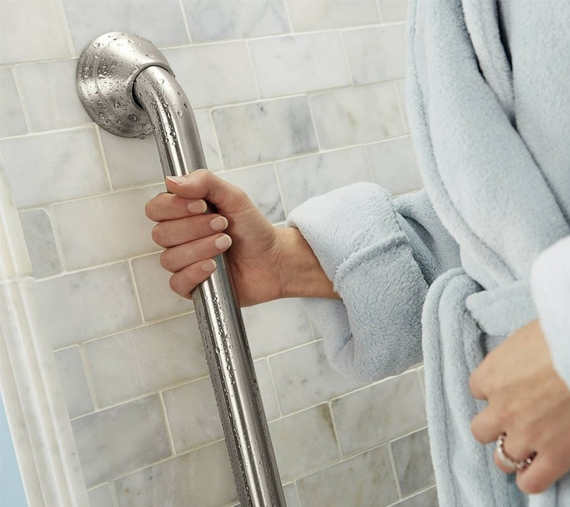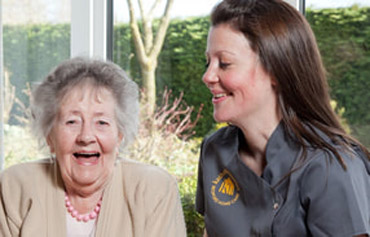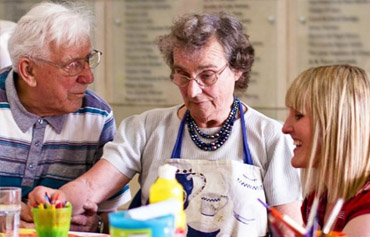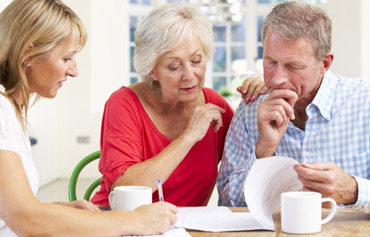Why Dementia Needs Safety
Dementia can cause a number of changes in the brain and body that may affect safety. Depending on the stage of the Dementia, these can include:
Judgment: forgetting how to use household appliances
Sense of time and place: getting lost on one’s own street; being unable to recognize or find familiar areas in the home
Behaviour: becoming easily confused, suspicious or fearful
Physical ability: having trouble with balance; depending upon a walking frame or wheelchair to get around
Senses: experiencing changes in vision, hearing, sensitivity to temperatures or depth perception
Although these changes can cause concern, they can easily be solved to create a safe, comfortable environment for you or your loved one.
Many people living with Dementia prefer to stay in the comfort of their own home with all their memories around them. It gives a feeling of independence and security.

Home Safety Tips
Assess the home
Look at the home through the eyes of a person with dementia. What objects could injure you/them? Identify possible areas of danger. Is it easy to get outside or is there a steep step in the way – if so, can a grab rail be installed? An Occupational Therapist (OT) can help you do this – please ask your GP or the Memory Clinic for a referral. You can also call the Herefordshire Advice & Referral Team direct if you prefer Tel: 01432 260101.
Make sure safety devices are in working order
It is important to ensure that smoke detectors and carbon monoxide detectors are installed and working properly in the home.
Herefordshire & Worcester Fire & Rescue (Tel: 0345 1224454) will visit your home free of charge and install any safety products that will keep you safe. Visit their website for more home safety tips Click here
Consider a Personal Alarm
Personal alarms (worn on the wrist or as a neck pendant) is highly recommended in case the person falls or is in need of help. When pressed, the alarm can go through to a family member or through to a call centre which can deal with an emergency.
Keep walkways well-lit
Add extra lights to entries, doorways, stairways, areas between rooms, and bathrooms. Use night lights in hallways, bedrooms and bathrooms to prevent accidents and reduce disorientation.
Medications
Place medications in a locked box/drawer if necessary.
To help ensure that medications are taken safely, use a pill box organiser or keep a daily list and check off each medication as it is taken.
Remove tripping hazards
Keep floors and other surfaces clutter-free. Remove objects such as thick rugs, magazine racks, coffee tables and floor lamps.
Watch the temperature of water
It may be difficult for the person living with dementia to tell the difference between hot and cold. Set water temperature at 48C or less to prevent scalding.
Support the person’s needs
Try not to create a home that feels too restrictive. The home should encourage independence and social interaction and the person should feel free to leave at anytime. If using a keysafe (a key in a box on the outside for carers to use), please ensure that the person is able to open the door from the inside.

What is Dementia and how to spot the signs?
The word Dementia describes a set of symptoms that may include memory loss and difficulties with thinking, problem-solving or language. These symptoms can be a result of various different conditions such as Alzheimer’s Disease and Vascular Dementia.
These symptoms are often small to start with, but for someone living with Dementia they can become severe enough to affect daily life.
Please click on the link below for more information .

Dementia-Friendly
Activities
The best activities for someone living with Dementia are any activities that they love doing.
It could be an activity or hobby they have always enjoyed or something new that they might like to try.
Do you or your loved one enjoy flowers and gardens, or perhaps singing or dancing? These types of activities can really help stimulate the mind and promote wellbeing.
We have put together some ideas and links to help you to find and take part in local activities – click the button below to find out more.

Power of Attorney & Advanced Decisions
When there has been a diagnosis of Dementia, it can cause concerns for what the future might hold.
Often individuals are concerned for their family members and want to help reduce the worry by putting in place agreed plans for the future.
These might include nominating a Power of Attorney to a trusted family member to make decisions on their behalf when they can no longer make a decision for themselves.
Click the button to find out more information
